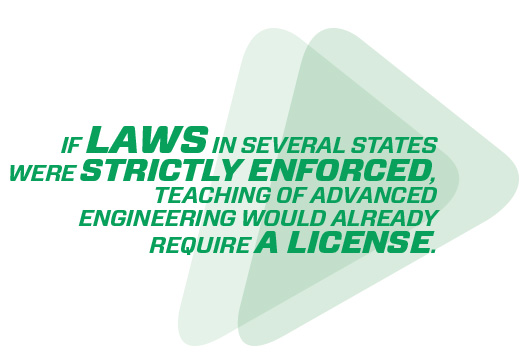Why the Double Standard?
When we urge students to become P.E.’s, we should lead by example.
OPINION BY ROB LANG & KIRANKUMAR TOPUDURTI
Engineering faculty members often stress to students the importance of a professional engineer’s license. As North Carolina State’s engineering college states on its website, “The P.E. license is the engineering profession’s highest standard of competence.” We also work hard to ensure that our programs receive continuing ABET accreditation, and certify to state licensing boards that our students have fulfilled the requirements for the Fundamentals in Engineering Exam, one of the prerequisites for a license in most jurisdictions.
Yet many faculty members themselves are not licensed. We believe that needs to change and that faculty licensure is an important step in raising the stature of the engineering profession. We therefore urge universities to set a goal of requiring a P.E. for all tenured faculty.
Some will argue that tenured and tenure-track faculty with doctorates already have very high credentials. This is undoubtedly true, but a license means something more. It means a practitioner can be trusted, as the NCEES Model Law puts it, to “safeguard life, health, and property and to promote the public welfare.” The need for this protection is made all too clear in the history of such spectacular and tragic failures as the 1919 Boston Molasses Flood, the 1940 Tacoma Narrows bridge collapse, the 1986 space shuttle Challenger disaster, the 2007 I-35 bridge collapse, and the 2010 Deepwater Horizon oil spill.
If we want our students to acquire both the theoretical and the practical knowledge to prevent such disasters in the future, don’t we owe it to them to set the same standard for ourselves? The National Society of Professional Engineers thinks we do: “NSPE recognizes the responsibility of engineering faculty to formulate curricula and to teach students to prepare them for the professional practice of engineering. To fulfill this responsibility as it relates to the public health, safety, and welfare, engineering faculty teaching advanced engineering subjects should be licensed professional engineers.”
Those of us who are licensed faculty tend to agree. As David Rockstraw, professor of chemical engineering at New Mexico State University, says: “Teaching the theory of ice skating and actually getting out on the rink are two different things. I earned my P.E. the old-fashioned way, by getting practical experience even after I became a faculty member.”
In the NCEES Model Law, the practice of engineering includes not only those aspects we readily associate with practice, such as planning, design, operation, investigation, and expert technical testimony, but also “teaching of advanced engineering subjects.” With the inclusion of teaching as practice, NCEES is in effect suggesting that jurisdictions should require licensure for engineering faculty. State statutes in Missouri, Alaska, Texas, and Wyoming contain similar language, indicating that faculty licensure is required if the laws are strictly enforced. The Wyoming Board of Registration apparently goes farther to “require that the dean of the College of Engineering and Applied Science at the University of Wyoming be a licensed P.E.”
Certain disciplines, such as software engineering, have not historically emphasized licensure, but that is changing. As Today’s Engineer reported early last year, “Nine states are moving legislation that will require licensure of software engineers, and it is expected that, eventually, every other U.S. state and territory will follow suit.”
What about those faculty who are mainly focused on research and development? To the extent that the R&D involves the practice of engineering (applied research and development, not the basic or fundamental research that is focused on advancing the science) and thereby can affect public health, safety, and welfare, the answer seems clear – they should be licensed or on the path to licensure.
Ideally, academia should take the lead, regulate itself, and encourage all current and new faculty members to obtain licenses. But if schools themselves fail, it would be up to professional societies and NCEES to encourage states not only to require faculty licensure but, once enacted, enforce the law.
Raising the stature of engineering begins with winning the respect of the public. Americans should be assured that those preparing future engineers to be responsible for public safety are equipped to set an example. .
Rob Lang, P.E., is a former dean and professor of civil engineering at the University of Alaska Anchorage. Kirankumar Topudurti, P.E., is deputy director of the Engineer Research and Development Center-Construction Engineering Research Laboratory, U.S. Army Corps of Engineers and an adjunct faculty member at the Illinois Institute of Technology.
Category: Last Word
